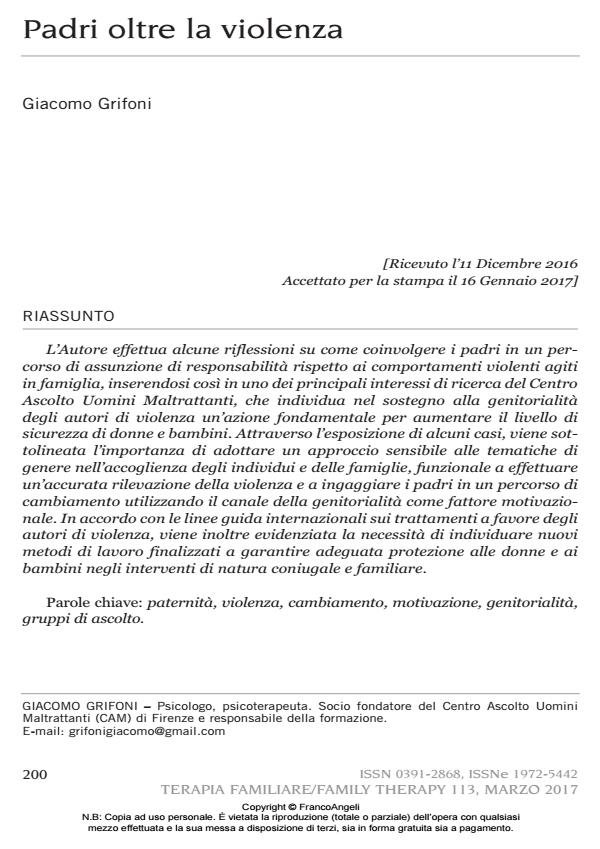Padri oltre la violenza
Journal title TERAPIA FAMILIARE. Rivista interdisciplinare di ricerca ed intervento relazionale
Author/s Giacomo Grifoni
Publishing Year 2017 Issue 2017/113
Language Italian Pages 22 P. 200-221 File size 125 KB
DOI 10.3280/TF2017-113012
DOI is like a bar code for intellectual property: to have more infomation
click here
Below, you can see the article first page
If you want to buy this article in PDF format, you can do it, following the instructions to buy download credits

FrancoAngeli is member of Publishers International Linking Association, Inc (PILA), a not-for-profit association which run the CrossRef service enabling links to and from online scholarly content.
The Author makes some reflections on how to involve fathers in a responsibility assumption process about violence behaviours within the household, thus joining one of the main reasearch interests of the Centro Ascolto Uomini Maltrattanti, which identifies the support to the parenthood of the authors of violence as an essential action aimed at increasing the safety level for women and children. Through the presentation of a few cases, the importance of adopting a sensitive approach to the relevant topics in receiving individuals and families is pointed out which is instrumental in carrying out accurate violence detection and engaging fathers in a change process by using the parenthood channel as a motivating factor. In accordance with the international guidelines on the treatments in favour of the authors of violence, the need to identify new working methods aiming at ensuring adequate protection for women and children in marital and family-related interventions is also pointed out.
Keywords: Fatherhood, violence, change, motivation, parenthood, listening groups.
- Bancroft L. (2002). The batterer as a parent, Synergy. Newsletter of the National Council of Juvenile and Family Court Judges, 6 (1): 6-8.
- Cirillo S. (2005). Cattivi genitori. Milano: Raffaello Cortina.
- Coffey D.S. (2009). Parenting after violence. A guide for practitioners. Philadelphia: Institute for Safe Families.
- Dytch A. (2012). Assessing partner abuse in couples therapy. -- Testo disponibile al sito: http://www.psychotherapy.net/article/couples-abuse-assessment. Data di consultazione: 28/10/2016.
- Fleck-Henderson A., Arean J.C. (2004). Breaking the Cycle: Fathering After Violence: Curriculum Guidelines and Tools for Batterer Intervention Program. San Francisco: Clark e Runner.
- Galtung J. (1996). Peace by Peaceful Means: Peace and Conflict, Development and Civilization. New York: Sage (trad. it.: Pace con mezzi pacifici. Milano: Esperia, 2000).
- Gondolf E.W. (1985). Men who batter: An integrated approach for stopping wife abuse. Holmes Beach, FL: Learning Publication.
- Grifoni G. (2015). Dal padre al figlio. La genitorialità del maltrattante tra rischi ed opportunità. Terapia Familiare, 108: 5-28. DOI: 10.3280/TF2015-108001
- Grifoni G. (2016). L’uomo maltrattante. Dall’accoglienza all’intervento con l’autore di violenza domestica. Milano: FrancoAngeli.
- Grosam I. (2012). Assessment for Domestic Violence in Couples Requesting Con-joint Therapy: Current Practice of Assessment among Licensed Thera-pists. Master of Social Work Clinical Research Papers. --Testo disponibile al sito: http://sophia.stkate.edu/msw_papers/29. Data di consultazione: 28/10/2016.
- Johnson M. (2000). A typology of domestic violence: intimate terrorism, violent resistance and situational couple violence. Boston, MA: Northeastern University Press.
- Linee guida per lo sviluppo di standard per i programmi che operano con uomini perpetratori di violenza domestica. --Testo disponibile al sito: http://www.work-withperpetrators.eu/fileadmin/WWP_Network/redakteure/2006_-_2012/guidelines/wwp_standards_it_2008_vers_1_1_1.pdf. Data di consultazione 28/10/2016.
- Ricci M.E., Langher V. (2012). I problemi dell’intervento psicologico-clinico nei casi di maltrattamento nella coppia. In: Velotti P., Legami che fanno soffrire. Dinamica e trattamento delle relazioni violente. Bologna: Il Mulino.
- Siegel D.J., Hartzell M. (2003). Parenting from the inside out: how a deeper self-understanding can help you raise children who thrive. New York: J.P. Tarcher/Putnam (trad. it.: Errori da non ripetere. Come la conoscenza della propria storia aiuta ad essere genitori. Milano: Raffaello Cortina, 2005).
Giacomo Grifoni, Padri oltre la violenza in "TERAPIA FAMILIARE. Rivista interdisciplinare di ricerca ed intervento relazionale" 113/2017, pp 200-221, DOI: 10.3280/TF2017-113012